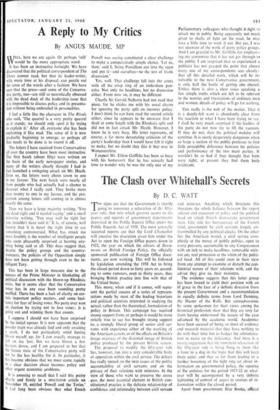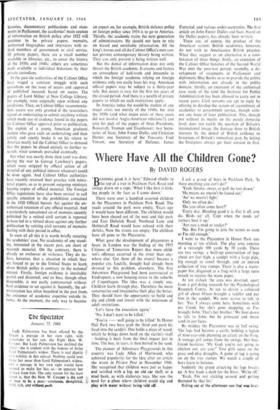The Clash over Whitehall's Secrets
By D. C. WATT
THE signs are that the Government is shortly going to announce a relaxation of lir fifty- year rule, that rule which governs access to the papers and records of government departments deposited in the Public Record Office under the Public Records Act of 1958. The most generally accepted reports are that the Lord Chancellor will exercise the discretion given him under the Act to open the Foreign.Office papers down to 1922, the year on which the editors of Docu- ments on British Foreign Policy, the officially sponsored publication of Foreign Office docu- ments, are now working. This will be followed by legislation amending. the 1958 Act to bring the closed period down to forty years or, accord- ing to some rumours, even to thirty years, thus bringing British practice into line with that of the United States.
This move, when and if it comes, will repre- sent the partial success of a series of represen- tations made by most of the leading historians and political scientists interested in studying the actual, rather than the theoretical, formulation of policy in Britain. This campaign has received strong support from, or perhaps it would be more strictly true to say has brought strong support to, a strongly liberal group of senior civil ser- vants with experience either of the working of the American system, or of the effects on Britain's image overseas of the distorted image of British policy produced by the present British system.
The proposal to modify the fifty-year rule has, however, run into a very considerable body of opposition within the civil service. The debate has really turned on the twin issues of the public accountability of civil servants and on the privacy of their relations with ministers. In the . view of those who want to, preserve the status ..quo, the most essential element in British con- . stitutional practice is the delicate relationship of confidence and informality between civil servant and minister. Anything which threatens this threatens the whole balance between the expert adviser and executant of policy and the political head on which British democratic government rests. One side lies bureaucracy of the French kind, government by civil servants largely un- trammelled.by any political checks. On the other lies the American model, a civil service com- pletely at the mercy of public politics, open to every pressure, accountable to any Congressman with an itch to make headlines, removable with- out any real protection at the whim of the politi- cal head. All of this could stem in their view from any attempt to examine or disturb the con- fidential nature of their relations with, and the advice they give to, their ministers.
The evidence suggests that this latter group has been forced to yield their position with an ill grace in the face of a definite direction from the present Government and a recommendation in equally definite terms from Lord Denning, the Master of the Rolls. But animadversions by some spokesmen for their views among the historical profession show that they are very far from having understood the nature of the case advanced by the academic world. Academics have been accused of being so short of evidence and research material that they have nothing to do with their time but to badger the administra- tion to make up the deficiency. And there is a strong suggestion that the imminent relaxation of the fifty-year rule is being flung to them like a bone to a dog in the hope that this will keep them quiet; and that so far from leading to a further loosening of the tight ring set about in- formation on governmental policy, the opening of the archives for the period 1915-22 or what- ever will be accompanied by a very definite tightening of control of access to sources of in- formation within the closed period.
Apart from government Blue Books, official histories, documentary publications and state- ments in Parliament, the academics' main sources of information on British policy after 1922 will continue to be private papers, memoirs, authorised biographies and interviews with re- tired members of government or civil service. Of private papers, there are a small number available in libraries, etc., to cover the history of the 1930s and 1940s; others are sometimes made available to individual historians by their private custodians.
In the past the authorities of the Cabinet Office have waged a constant struggle with such custodians on the issue of access and approval of published research based on access. The papers of Lord Milner at New College Library, for example, were originally open without any conditions. Then, on Cabinet Office recommenda- tion, access was only granted if the researchers signed an undertaking to submit anything written which made use of evidence found in the papers for Cabinet Office approval prior to publication, The exploit of a young American graduate, student who gave such an undertaking and then calmly and openly broke it on his return to America nearly led the Cabinet Office to demand that the papers be closed entirely to further re- search; wiser counsels prevailed eventually.
But what was nearly done then (and was done during the war to George Lansbury's papers, which were stripped by official action of all material of any political interest whatever) could( be done again. And Cabinet Office authorities have recently reversed their practice with minis- terial papers, so as to prevent outgoing ministers keeping copies of official material. The Foreign Office regulations have also been revised to call specific attention to the prohibition contained in the 1920 Official Secrets Act against the un- authorised retention of any official material. And a particularly sensational set of memoirs recently published by a retired civil servant is reported to have led to a virtual ukase against any further publication by retiring civil servants of memoirs dealing with their period in office.
In view of all this it is worth briefly restating the academics' case. No academics of any stand- ing, interested in the recent past, are short of research material. On the contrary, there is already an embarras de richesses. They do be lieve, however, that a situation in which they are forced to go to the United States to learn about British policy is contrary to the national interest. Firstly, foreign evidence is inevitably partial and distorted; and its bias, though often discernible, is not easily controverted without hard evidence to set against it. Secondly, the ad- ministration has often benefited in the past from the existence of academic expertise outside its ranks. At the moment, the only way to become
an expert on, for example, British defence policy or foreign policy since 1954 is to go to America. Thirdly, the academic trains the next generation of administrators. He should not have to rely on biased and unreliable information. All the king's horses and all the Cabinet Office's men can- not prevent contemporary history being written. They can only prevent it being written well.
But the denial of information does not only thwart the British academic. It creates and fosters an atmosphere of half-truth and innuendo in which the foreign academic relying on foreign evidence only too easily loses his way. American official papers may be subject to a thirty-year rule. But access is easy for the first ten years of the closed period. And there is a wealth of private papers to which no such restrictions apply.
In America today the would-be student of any major crisis not merely of the 1940s, but also the 1950s (and what major crisis of these years did not involve Anglo-American relations?), can take his pick of the papers of three Presidents, Roosevelt, Truman and Eisenhower; two Secre- taries of State, John Foster Dulles and Christian Herter; one Secretary of the Treasury, Fred Vinson; one Secretary of Defence, James Forrestal; and various under-secretaries. The first article on John Foster Dulles and Suez. based on the Dulles papers, has already been written.
These are, of course, the product of the American system. British academics, however, do not wish to Americanise British practice. What they suggest as an alternative is a com- bination of three things; firstly, an extension of the Cabinet Office histories of the Second World War into the post-war period; secondly, a de- velopment of statements in Parliament and diplomatic Blue Books so as to provide the public with information not already in the public domain; thirdly, an extension of the authorised case study of the kind the Institute for Public Administration has been allowed to carry out in recent years. Civil servants are apt to reply by offering to develop the system of secondment of academics to government service, though with- out any hope of later publi6tion. This, though not without its merits on the purely domestic level, does not tackle the question of Britain's international image, the damage done to British interests by the denial of British evidence to historians of Britain's immediate past, by letting the -foreigners always get their version in first.



































 Previous page
Previous page